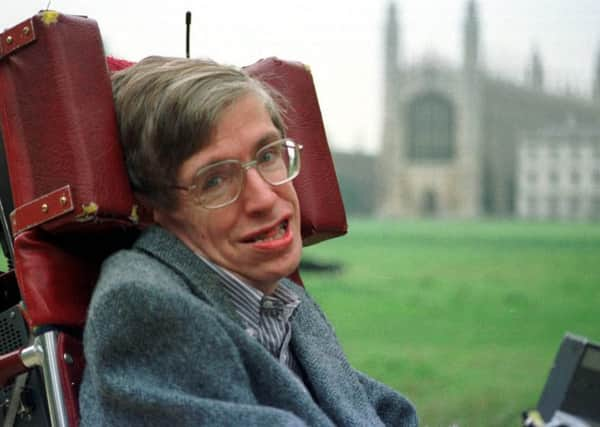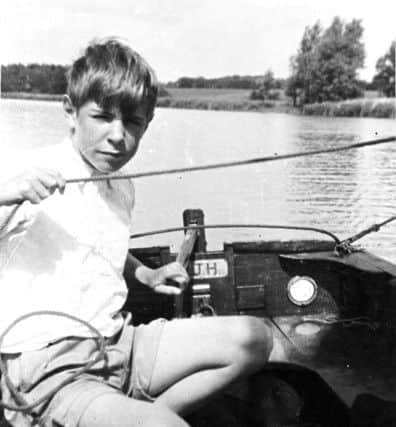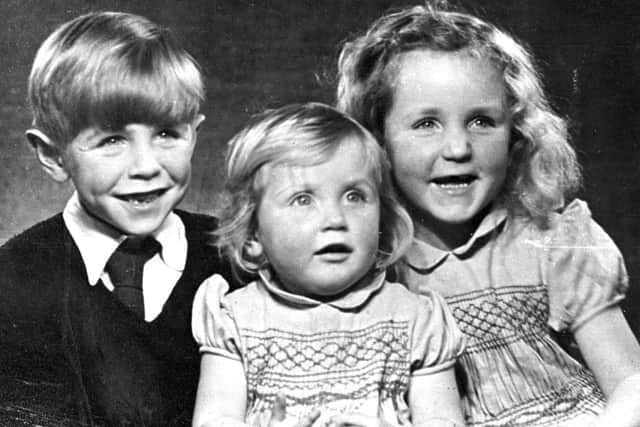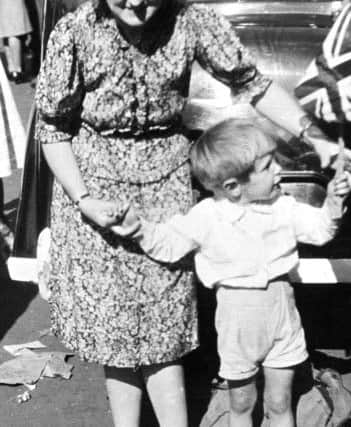How Stephen Hawking reminded us all to look up at the stars


Stephen Hawking was one of the world’s most acclaimed cosmologists, a medical miracle, and probably the galaxy’s most unlikely superstar celebrity.
After being diagnosed with a rare form of motor neurone disease in 1963 at the age of 22, he was given just a few years to live.
Advertisement
Hide AdAdvertisement
Hide AdYet in the face of such adversity Professor Hawking proved the doctors wrong by celebrating his 70th birthday nearly half a century later as one of the most brilliant and famous scientists of the modern age.


Despite being wheelchair-bound, almost completely paralysed and unable to speak except through his trademark voice synthesiser, he wrote a plethora of scientific papers that earned him comparisons with such totemic figures as Albert Einstein and Sir Isaac Newton.
At the same time he embraced popular culture with enthusiasm and humour, appearing in TV cartoon The Simpsons, starring in Star Trek and providing the voice-over for a British Telecom commercial that was later sampled on rock band Pink Floyd’s The Division Bell album.
His rise to fame and relationship with his first wife, Jane, was dramatised in the 2014 film, The Theory Of Everything, in which Eddie Redmayne put in an Oscar-winning performance as the physicist battling with a devastating illness.
Advertisement
Hide AdAdvertisement
Hide AdProf Hawking was best known for his work on black holes, the mysterious infinitely dense regions of compressed matter where the normal laws of physics break down, which dominated the whole of his academic life.


His crowning achievement was his prediction in the 1970s that black holes can emit energy, despite the classical view that nothing - not even light - can escape their gravity.
Hawking Radiation, based on mathematical concepts arising from quantum mechanics - the branch of science that deals with the weird world of sub-atomic particles, eventually causes black holes to “evaporate” and vanish, according to the theory.
Born in Oxford on January 8, 1942 - 300 years after the death of astronomer Galileo Galilei - Hawking grew up in St Albans.
Advertisement
Hide AdAdvertisement
Hide AdHe had a difficult time at the local public school and was labelled a “swot” who was more interested in jazz, classical music and debating than sport and pop. Although not top of the class, he was good at maths and “chaotically enthusiastic in chemistry”.


As an undergraduate at Oxford, the young Hawking was so good at physics that he got through with little effort. He later calculated that his work there “amounted to an average of just an hour a day” and commented: “I’m not proud of this lack of work, I’m just describing my attitude at the time, which I shared with most of my fellow students.
“You were supposed to be brilliant without effort, or to accept your limitations and get a fourth-class degree.”
Hawking got a first and went to Cambridge to begin work on his PhD, but by this time he was already beginning to experience early symptoms of his illness. During his last year at Oxford he became clumsy, and twice fell over for no apparent reason. Shortly after his 21st birthday he went for tests, and he was later diagnosed with amyotrophic lateral sclerosis (ALS), a form of motor neurone disease.
Advertisement
Hide AdAdvertisement
Hide AdThe news came as a huge shock that for a time plunged the budding academic into deep despair. However, he was rescued by an old friend, Jane Wilde, who went on to become his first wife and with whom he had three children.


After a painful period coming to terms with his condition, Prof Hawking threw himself into his work.
At one Royal Society meeting, the still-unknown Hawking interrupted a lecture by renowned astrophysicist Sir Fred Hoyle, then at the pinnacle of his career, to inform him that he had made a mistake.
When an irritated Sir Fred asked how Hawking presumed to know that his calculations were wrong, Hawking replied: “Because I’ve worked them out in my head.”
Advertisement
Hide AdAdvertisement
Hide AdIn the 1980s, Prof Hawking and Professor Jim Hartle, from the University of California at Santa Barbara, proposed a model of the universe which had no boundaries in space or time. The concept was described in his popular science book A Brief History Of Time, published in 1988, which sold millions of copies worldwide.
As well as razor sharp intellect, Prof Hawking also possessed an almost child-like sense of fun, which helped to endear him to members of the public.
He booked a seat on Sir Richard Branson’s Virgin Galactic sub-orbital space plane and rehearsed for the trip by floating inside a steep-diving Nasa aircraft - dubbed the “vomit comet” - used to simulate weightlessness.


On one wall of his office at Cambridge University was a clock depicting Homer Simpson, whose theory of a “doughnut-shaped universe” he threatened to steal in an episode of the cartoon show. He is said to have glared at the clock whenever a visitor was late.
Advertisement
Hide AdAdvertisement
Hide AdUpheaval in his personal life also hit the headlines, and in February 1990 he left Jane, his wife of 25 years, to set up home with one of his nurses, Elaine Mason. The couple married in September 1995 but divorced 11 years later.
Throughout his career Prof Hawking was showered with honorary degrees, medals, awards and prizes, and in 1982 he was made a CBE.
But he also ruffled a few feathers within the scientific establishment with far-fetched statements about the existence of extraterrestrials, time travel, and the creation of humans through genetic engineering.
He has also predicted the end of humanity, due to global warming, a new killer virus, or the impact of a large comet.
Advertisement
Hide AdAdvertisement
Hide AdIn 2015 he teamed up with Russian billionaire Yuri Milner who has launched a series of projects aimed at finding evidence of alien life. The decade-long Breakthrough Listen initiative aims to step up the Search for Extraterrestrial Intelligence (Seti) by listening out for alien signals.
The even bolder Starshot Initiative, announced in 2016, envisages sending tiny light-propelled robot spacecraft on a 20-year voyage to the Alpha Centauri star system.
Meanwhile Prof Hawking’s “serious” work continued, focusing on the thorny question of what happens to all the information that disappears into a black hole. One of the fundamental tenets of physics is that information data can never be completely erased from the universe.
A paper co-authored by Prof Hawking and published online in Physical Review Letters in June 2016 suggests that even after a black hole has evaporated, the information it consumed during its life remains in a fuzzy “halo” - but not necessarily in the proper order.
Advertisement
Hide AdAdvertisement
Hide AdHe has long been a vocal champion of the NHS and right up until his final months sparred with Health Secretary Jeremy Hunt. He recently said he would not have had such a long life without the NHS, and less than two months ago a campaign group backed by Prof Hawking was granted permission to challenge Mr Hunt in the High Court over plans to allow private companies to play a greater role in the service.
The scientist had warned it was an “attack on the fundamental principles of the NHS” to allow commercial businesses to run parts of the health and social services.
It’s his scientific achievements, though, for which Prof Hawking will forever be remembered.
Dr Harry Cliff, a particle physicist and Fellow of Modern Science at the Science Museum, was an undergraduate at Gonville and Caius college at Cambridge University where he worked and remembers the ripples of excitement whenever he entered a room.
Advertisement
Hide AdAdvertisement
Hide Ad“We would often see him at dinner and all the students would be straining their necks to catch a glimpse of him eating and drinking with the other fellows.”
He had a mischievous side, too. “Occasionally you would meet him in the courtyard or on the streets of Cambridge and he had this habit of trying to run over students toes. If he saw a group of you come up the footpath he’d accelerate towards you.”
Dr Cliff says Prof Hawking enjoyed making bets with famous fellow physicists about the big questions in science. “I think he lost three different bets throughout his life on various things and whether they would come true. Most recently I think he bet that the Higgs boson, which was discovered at Cern a few years ago, wasn’t going to be found, so he lost that one.”
Dr Cliff says he didn’t allow his condition to prevent him working. “If you think you haven’t got very long to live it focuses the mind and makes you use what time you have. He also didn’t have to do the things academics usually do like appear on committees and he could just get on with his physics.”
Advertisement
Hide AdAdvertisement
Hide AdIt helped make him the world’s most famous scientist. “The only other comparable figure is Einstein and I suspect people will still be talking about Stephen Hawking for many centuries.”
Perhaps, though, the last words should go to the man himself:
“Remember to look up at the stars and not down at your feet. Try to make sense of what you see and wonder about what makes the universe exist. Be curious. And however difficult life may seem, there is always something you can do and succeed at. It matters that you don’t just give up...”